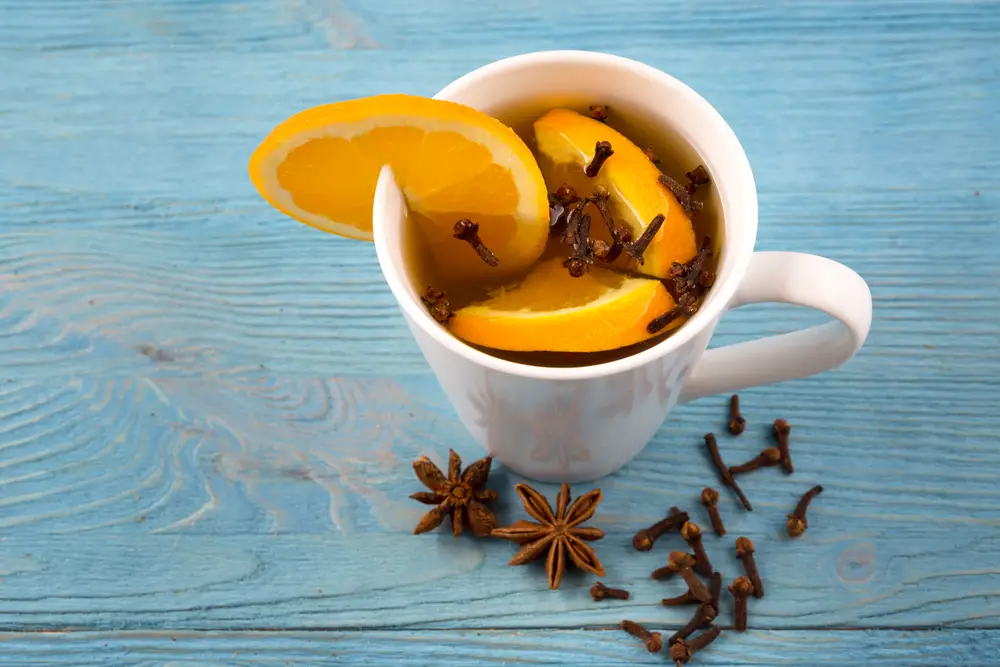Tea with cloves, also known as Laung tea or Lavang tea, has been gaining popularity due to its numerous health benefits and aromatic flavour. Originating from the versatile clove spice, this infusion offers significant advantages for overall well-being. With an increasing number of tea enthusiasts turning towards herbal options, clove tea stands out as a potent and promising choice for those looking to improve their wellness routine.
Clove tea contains various important vitamins, minerals, and antioxidants, which help reduce oxidative stress and combat free radical damage to the body.
Moreover, this flavorful beverage possesses antiseptic, antiviral, and antimicrobial properties that can keep common infections, coughs, and colds at bay. Another notable advantage of consuming clove tea is its ability to improve digestion, which can ultimately contribute to weight loss.
Considering these benefits and the delightful taste of clove tea, it is no wonder that more people are beginning to include this herbal drink in their daily routines. Among the variety of herbal teas available, clove tea offers a unique combination of enticing aroma, delectable flavour, and a host of advantages to boost overall health and well-being.
Health Benefits of Drinking Tea with Cloves
Tea with cloves is a popular herbal drink known for its numerous health benefits. Rich in antioxidants, this infusion can help combat free radicals in the body, contributing to overall well-being and supporting the immune system.
One of the key compounds behind the health benefits of clove tea is eugenol. Eugenol boasts several properties, such as anti-inflammatory and antiviral effects, which may aid in preventing infections, colds, and coughs. Moreover, the antimicrobial properties of cloves can play an important role in maintaining oral health, providing relief from toothache and gum pain.
Drinking clove tea may also contribute to healthy digestion and weight loss. Enhanced digestion not only helps reduce bloating and gas but can also accelerate the weight loss process. Additionally, the bioactive compounds found in cloves may further promote weight loss by increasing metabolism and regulating appetite.
While there is ongoing research on the topic, some studies suggest that the antioxidants and anti-inflammatory compounds in clove tea may potentially lower the risk of developing certain types of cancer. The eugenol-rich tea may help prevent inflammation-related diseases and chronic conditions, further bolstering overall health.
In summary, drinking tea with cloves offers several health benefits, primarily due to its antioxidant, anti-inflammatory, and antimicrobial properties. A regular consumption of this aromatic tea can enhance one’s immune system, promote healthy digestion and weight loss, and may even reduce the risk of certain diseases.
Ingredients and Preparation of Clove Tea
Clove tea is a delightful herbal infusion known for providing various health benefits, such as antioxidant, antiviral, and antibacterial effects. For this recipe, you will need cloves, water, and optional additions for taste and extra benefits, such as ginger, honey, cinnamon, or lemon.
To begin, gather the following ingredients:
- 2 grams (2 teaspoons) of whole or ground cloves
- 2 cups of water
- Optional ingredients: A slice of ginger, 1 teaspoon of honey, a pinch of cinnamon, or a few drops of lemon juice
Now, let’s prepare the clove tea following these steps:
- In a saucepan, bring 2 cups of water to a boil.
- If using whole cloves, grind them before proceeding. A fine powder is not necessary; crushed cloves will also work well.
- Add the ground or crushed cloves to the boiling water. If you prefer, you can also add a slice of ginger, a pinch of cinnamon, or both for added flavour and health benefits at this point.
- Reduce the heat and let the tea simmer for 5-7 minutes. This will allow the flavours to infuse and create a deliciously aromatic infusion.
- Once the simmering step is finished, remove the saucepan from the heat and let the tea steep for an additional 2-3 minutes to further intensify the flavour. This step is essential in achieving a well-balanced and pleasant-tasting tea.
- After steeping, strain the tea using a fine-mesh strainer or tea infuser to remove the cloves and any other added ingredients.
- Pour the strained tea into a cup, and flavour it with honey or a few drops of lemon juice if desired. This will not only make the tea more delicious but also enhance its soothing and warming qualities.
Enjoy your aromatic and flavourful clove tea, reaping its numerous health benefits while savouring its unique and comforting taste.
Nutritional Content of Cloves
Cloves are an aromatic spice that provide various health benefits, primarily due to their nutritional content. They are commonly used in making hot beverages such as clove tea, which offers an enjoyable and healthy drinking experience.
One of the main nutrients present in cloves is manganese, which is an essential trace mineral that helps with various bodily functions. In fact, 2 grams (2 teaspoons) of cloves contain about 55% of the daily value of manganese. This mineral plays a crucial role in bone formation, blood clotting, and maintaining the proper functioning of the nervous system.
In addition to manganese, cloves are also a source of vitamin K. Consuming 2 teaspoons of cloves can provide approximately 2% of the daily value of vitamin K1. This fat-soluble vitamin is essential for blood clotting, bone metabolism, and regulating blood calcium levels.
Furthermore, cloves contain a good amount of dietary fiber. With 1 gram of fiber in every 2 teaspoons, cloves can contribute to a healthy digestive system and support regular bowel movements.
When considering the caloric content of cloves, they are relatively low in calories. On average, 2 teaspoons of cloves contain about 6 calories. This makes cloves a suitable addition to a weight-conscious diet, as adding flavour without adding excessive calories.
While cloves are not particularly high in vitamin C and calcium, they can still provide trace amounts of these essential nutrients. The presence of vitamin C aids the immune system and boosts overall health, while the calcium contributes to strong bones and teeth.
In summary, consuming cloves through tea or other means can offer a range of nutritional benefits. These include significant amounts of manganese, vitamin K, and dietary fiber, with a low caloric content. The combination of these nutrients promotes overall health and well-being, making cloves a valuable addition to a balanced diet.
Effects on Blood Sugar and Diabetes
Drinking tea with cloves can have potential benefits for people living with diabetes and maintaining healthy blood sugar levels. Tea, especially green and black tea, contains polyphenols that may provide protective effects against the development of diseases such as diabetes, arthritis, and cancer. Cloves, on the other hand, have been found to increase the secretion of insulin and help manage blood sugar levels.
An important factor in managing diabetes is improving insulin sensitivity. Regular consumption of tea may aid in this aspect, resulting in better blood sugar control. Studies have shown that cloves can also contribute to lowering blood sugar levels in the bloodstream for both type 1 and type 2 diabetes.
In addition to improved insulin sensitivity, drinking tea with cloves may offer other advantages such as maintaining healthy blood pressure, reducing inflammation, and decreasing the risk of cardiovascular complications in people with diabetes. The combination of tea and cloves provides a natural treatment option that complements traditional diabetes management methods.
While tea and cloves show promise in promoting blood sugar control, it is essential to remember that they should not replace prescribed medication or professional medical advice. It is advisable to consult your healthcare professional while incorporating tea with cloves into your daily routine to ensure optimal blood sugar management.
Antiviral and Antibacterial Properties
Tea with cloves boasts a range of health benefits, particularly in terms of its antimicrobial properties. This combination has the potential to combat various infections and illnesses caused by bacteria and viruses.
Cloves, the dried flower buds of the Syzygium aromaticum tree, are known for their rich array of antioxidants, vitamins, and minerals. They have been widely used in traditional Chinese and Ayurvedic medicine for centuries to treat numerous ailments. One of the key therapeutic benefits of cloves is their ability to exhibit potent antimicrobial, antiviral, and antibacterial effects.
In addition to clove’s therapeutic properties, certain herbal teas also possess antimicrobial activities that can help protect against infections. These teas are rich in health-promoting compounds and can offer protection against various diseases, including cardiovascular disorders, obesity, diabetes, and even cancer.
When combined, tea and cloves create a highly effective natural remedy against bacterial and viral infections. The high concentration of antioxidants present in clove tea serves to combat free radicals, thus helping to support the body’s overall immune system.
In summary, drinking tea with cloves can be a useful addition to one’s health regimen, thanks to their antiviral and antibacterial properties. Remember to always consult a healthcare professional before incorporating any new remedies into your daily routine.
Clove Tea for Digestion and Bloating
Clove tea is known for its beneficial effects on digestion and reducing bloating issues. The warm nature of cloves can improve digestive fire and stimulate the secretion of digestive juices, helping to reduce gas and bloating issues. The organic compound eugenol, found in cloves, also plays a significant role in dealing with minor digestive complaints such as diarrhoea and gas.
To prepare clove tea, simply steep 2 grams of crushed or whole cloves in boiling water for approximately 5 to 10 minutes, strain, and enjoy. Drinking this tea regularly can lead to a healthier digestive system and help with weight loss by promoting a more efficient digestion.
In addition, cloves possess antiseptic, antiviral, and antimicrobial properties. Incorporating clove tea into your diet may keep common infections, colds, and cough at bay. It also contains antioxidants that help in fighting free radical damage to the body and boosting the immune system.
Besides aiding digestion and addressing bloating issues, clove tea may also offer relief from nausea and vomiting. The potent aroma and soothing warmth of cloves have a calming effect on the stomach, helping to alleviate symptoms of upset stomach and nausea.
In summary, drinking clove tea can provide various benefits for digestion, reducing bloating, and relieving gastrointestinal disturbances such as gas, nausea, and vomiting. Incorporate this fragrant and beneficial tea into your routine and enjoy the potential improvements in your digestive health.
Benefits for Oral and Skin Health
Drinking tea with cloves offers several advantages for oral and skin health. Cloves are a natural antiseptic with antibacterial and anti-inflammatory properties, which makes them an excellent addition to beverages like tea.
For oral health, cloves can provide relief from tooth pain and toothache. They have been traditionally used in Ayurvedic and Chinese medicine to alleviate sore gums and oral discomfort. Adding cloves to your tea may help in reducing swelling and discomfort related to dental issues, therefore acting as a temporary solution for toothaches.
Cloves also serve as a natural mouthwash. Their antiseptic properties help in fighting oral bacteria and reducing plaque build-up. By incorporating cloves in your daily cup of tea, you not only get a refreshing beverage but also support the maintenance of healthy teeth and gums.
When it comes to skin health, cloves may help combat acne. Their antibacterial and anti-fungal properties help in the treatment of acne and pimples. Although direct application of clove oil on skin should be avoided due to potential irritation, consuming clove-infused tea can still provide some benefits for your skin.
Furthermore, the antioxidants present in cloves can contribute to healthier skin by reducing oxidative stress. Drinking tea with cloves provides a natural way to obtain these antioxidants, which may support overall skin health and contribute to a more even skin tone.
In summary, adding cloves to your tea can offer several oral and skin health benefits. From soothing tooth pain to potentially improving skin conditions, cloves provide a simple and natural way to boost the overall well-being of your teeth and skin.
Clove Tea for Colds, Coughs, and Congestion
Clove tea is a popular choice for those who suffer from colds, coughs, and congestion. It contains compounds that are known for their antioxidant and antiviral properties, helping to combat the oxidative stress caused by an infection.
The key component in cloves that is responsible for these therapeutic effects is eugenol. Eugenol has anti-inflammatory properties, making it effective in reducing inflammation in the respiratory tract. This can be particularly helpful for those experiencing sinus congestion or a cough due to a cold or a fever.
Drinking clove tea not only provides relief from congestion but also soothes the throat and helps to suppress a cough. The antiseptic and antimicrobial properties of cloves work to fight common infections, thus aiding in the recovery process.
To prepare clove tea, simply steep a few cloves in hot water for about 10 minutes. Adding ingredients such as ginger and honey can further enhance the soothing effects of the tea, and contribute additional health benefits.
In summary, clove tea is a natural and effective option for those suffering from colds, coughs, and congestion. The potent properties of cloves work to combat infection and provide relief from discomfort.
Precautions and Side Effects
Drinking tea with cloves has numerous benefits, but it is essential to bear in mind the possible side effects and precautions. Consuming cloves in moderation is crucial, as excessive intake can lead to adverse effects. Some of the known side effects include local irritation, rare allergic reactions, and contact dermatitis. Moreover, ingesting large amounts of cloves may result in severe consequences such as liver and kidney damage, seizures, and coma.
It is important to be aware of the potential interactions between cloves and certain medications. For instance, cloves may interact with warfarin, an anticoagulant medication, increasing the risk of bleeding3. Therefore, patients on warfarin should consult their healthcare provider before consuming cloves to avoid possible complications.
Additionally, the caffeine content in tea can also cause side effects, particularly for those sensitive to it. Common complications associated with excessive caffeine consumption consist of rapid heart rate, increased anxiety, insomnia, and digestive issues4. Thus, monitoring caffeine intake is necessary while enjoying tea with cloves.
In summary, the benefits of drinking tea with cloves can be maximised by being cautious about the potential side effects and interactions with medications. Striking the right balance in consumption and seeking advice from healthcare professionals can help mitigate the risks and ensure a safe and enjoyable experience.
Incorporating Cloves into Your Diet
Cloves are a versatile spice that can easily be incorporated into various dishes in your diet. Known for their distinctive flavour and aroma, cloves originate from Asia and are commonly used in traditional curries and other foods from the region. They offer numerous health benefits, making them a valuable addition to your kitchen.
Integrating cloves into your diet can be as simple as adding them to your daily tea. Adding a few cloves to your tea not only enhances the flavour but also provides health benefits such as improved digestion and antioxidants. Clove tea can be enjoyed without milk or sugar, and you may even sweeten it with honey if desired. This blend is a great option for those on a weight loss journey, as it can help regulate hunger levels as well.
Incorporating cloves into your meals is also an excellent way to enjoy their flavour and nutritional benefits. For example, cloves can be added to various baked goods like cookies, cakes, and bread to enrich their taste. You may use whole or ground cloves, which contain essential nutrients such as fibre, vitamins, and minerals.
As a versatile spice, cloves can also be combined with other spices to create flavourful spice mixes for marinating meat or seasoning vegetables. This not only adds a unique taste to dishes but also helps enhance the nutrient content of your meals.
Using clove oil in your recipes is another way to incorporate cloves into your diet. This oil is extracted from the clove plant and has its own set of advantages, such as supporting oral health and providing relief from muscle pain. Although it is potent, using clove oil in moderation can serve as a useful addition to foods like homemade salad dressings, stir-fries, and marinades.
Finally, cloves are a staple in many Asian dishes, particularly curries. They can add depth, warmth, and a subtle sweetness to a variety of recipes. Experimenting with cloves in your everyday cooking allows you to expand your culinary repertoire and experience the rich flavours this spice has to offer.
Frequently Asked Questions
What are the health benefits of clove tea?
Clove tea is known for its numerous health benefits, including improved digestion, enhanced skin health, and promotion of bone health. Additionally, its antiseptic properties may help heal skin infections, while its numbing effects can provide relief from tooth and gum pain.
How does clove tea aid in weight loss?
Clove tea may aid in weight loss by improving digestion and detoxifying the system. This can help the body process food more efficiently and make it easier for individuals to manage their weight.
Can cloves improve sexual health?
Some research suggests that cloves have aphrodisiac properties, which may be attributed to the compound eugenol. However, there is not enough scientific evidence to decisively confirm cloves’ effects on sexual health. More research is needed in this area.
What are the potential side effects of drinking clove tea?
Some individuals may experience side effects from consuming clove tea, including digestive issues, such as diarrhoea and gas. It’s important to consult a healthcare professional if any adverse reactions arise after drinking clove tea.
How much clove tea is considered safe to consume?
There is no specific recommended daily intake for clove tea, as it varies depending on individual factors, such as age, weight, and overall health. It’s essential to consult a healthcare professional to determine the appropriate amount of clove tea for your needs.
Is it beneficial to drink clove tea before bedtime?
Clove tea has a warming and soothing effect, which can be relaxing and conducive to a good night’s sleep for some individuals. However, everyone’s body reacts differently, so it’s essential to pay attention to your body’s response and adjust your clove tea consumption accordingly.
My name is Ellis Francis and I have been a personal fitness trainer, sports nutritionalist and health and fitness advisor for over 25 years. I am the lead health and fitness advisor at https://awellnessbody.com.







